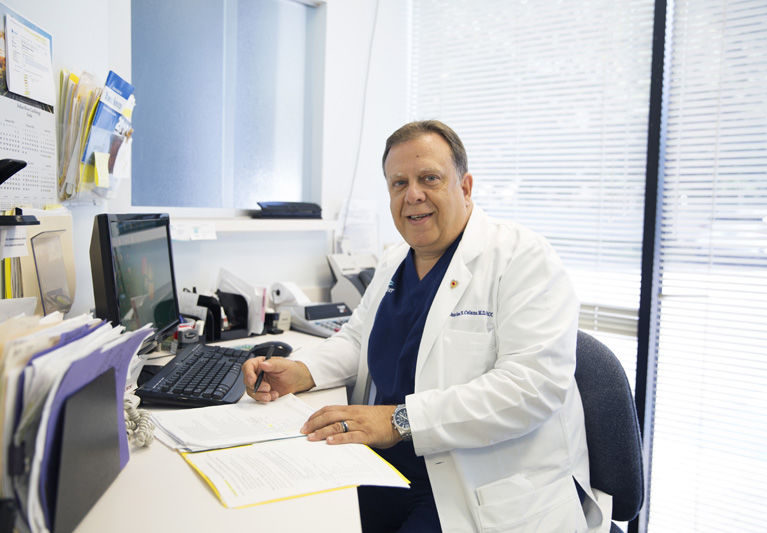
Quick quiz: If you were asked to name four behaviors that health experts say define a “healthy lifestyle,” what would you say?
The answer is a good diet, moderate exercise, a recommended body fat percentage, and being a non-smoker. You may not have identified all four, but we bet they’re all pretty familiar; most of us have been given this advice by our health care team numerous times.
Familiarity has not led to compliance, however – recent research from Oregon State University and the University of Mississippi shows that only 2.7 percent of the U.S. adult population achieves all four of these behavioral characteristics.
Charles Celano, MD, a cardiologist associated with Indian River Medical Center, is not surprised that less than 3 percent achieve what is considered a healthy lifestyle; he says the degree of difficulty varies among the four characteristics. “It’s easier to be a non-smoker than it is to meet the definition of moderate exercise (150 minutes per week), and sustaining a healthy diet over the long-term can also be difficult.”
While Dr. Celano, who is board-certified in both cardiology and internal medicine, wasn’t surprised by the results, the researchers themselves were. Ellen Smit, senior author of the study and an associate professor in the OSU College of Public Health and Human Sciences, says “the behavior standards we were measuring for were pretty reasonable, not super high. We weren’t looking for marathon runners.”
These four lifestyle characteristics do not exist in a “nice to have” vacuum; they are associated with a lower risk of cardiovascular disease and other health problems. Vero’s Dr. Celano says non-adherence to these characteristics can lead to “metabolic syndrome,” a cluster of conditions that occur together: increased blood pressure, high blood sugar, excess body fat around the waist, and abnormal cholesterol or triglyceride levels. Metabolic syndrome increases the risk of heart disease, stroke, and diabetes.
The study results were based on a group of 4,745 people who participated in the National Health and Nutrition Examination Survey, a program of studies designed to assess the health and nutritional status of adults and children in the United States. The researchers say part of the value of the study was that it did not just rely on self-reported information (which can be inaccurate for both intentional and non-intentional reasons); it also included several measured behaviors:
• Measurements of activity were done with an accelerometer, a device people wore to determine their actual level of movement.
• Blood samples were done to verify a person was a non-smoker.
• Body fat was measured with sophisticated X-ray absorptiometry, not just a crude measurement based on weight and height.
• A healthy diet was defined in this study as being in about the top 40 percent of people who ate foods recommended by the USDA. (Dr. Celano says that most of the diet plans that wax and wane in popularity have a few things in common – controlled portions, low fat, and the inclusion of “good carbs” such as leafy and colorful vegetables and fresh fruits, berries, nuts and seeds.)
The lifestyle characteristics were then compared to “biomarkers” of cardiovascular health, the most familiar being blood pressure, cholesterol and glucose levels. Comparisons were also made to more sophisticated biomarkers that can provide evidence of cardiovascular risk, such as C-reactive protein (substance produced by the liver that increases in the presence of inflammation in the body), and Triglycerides, a type of fat found in the blood.
So if only 2.7 percent of the study participants achieved all four healthy behaviors, how many had three of the four? That number – 16 percent – is also low (37 percent had two, 34 percent had just one, and 11 percent had none). One of the few pieces of encouraging news from the study is that 71 percent of participants did not smoke.
A few more words about exercise: Dr. Celano tells his patients that, while exercising 150 minutes each week (5 days at 30 minutes per day) may be difficult to achieve, any sort of physical activity is good. “A casual walk, water aerobics, golfing – even with a cart – all have health benefits,” he says. “Just because your level of activity doesn’t meet the textbook definition of moderate exercise doesn’t mean it doesn’t have value.”
Dr. Celano strongly believes in a “team” approach to health; team members include the patient, their primary care physician and nurses, their specialists, and, if applicable, their nutritionist and trainer. He says, “The partnership is really important to identify root causes of health problems, and not just treat the symptoms.”
Dr. Celano’s office is located at 3607 15th Avenue in Vero Beach; the phone number is 772-562-8522.



